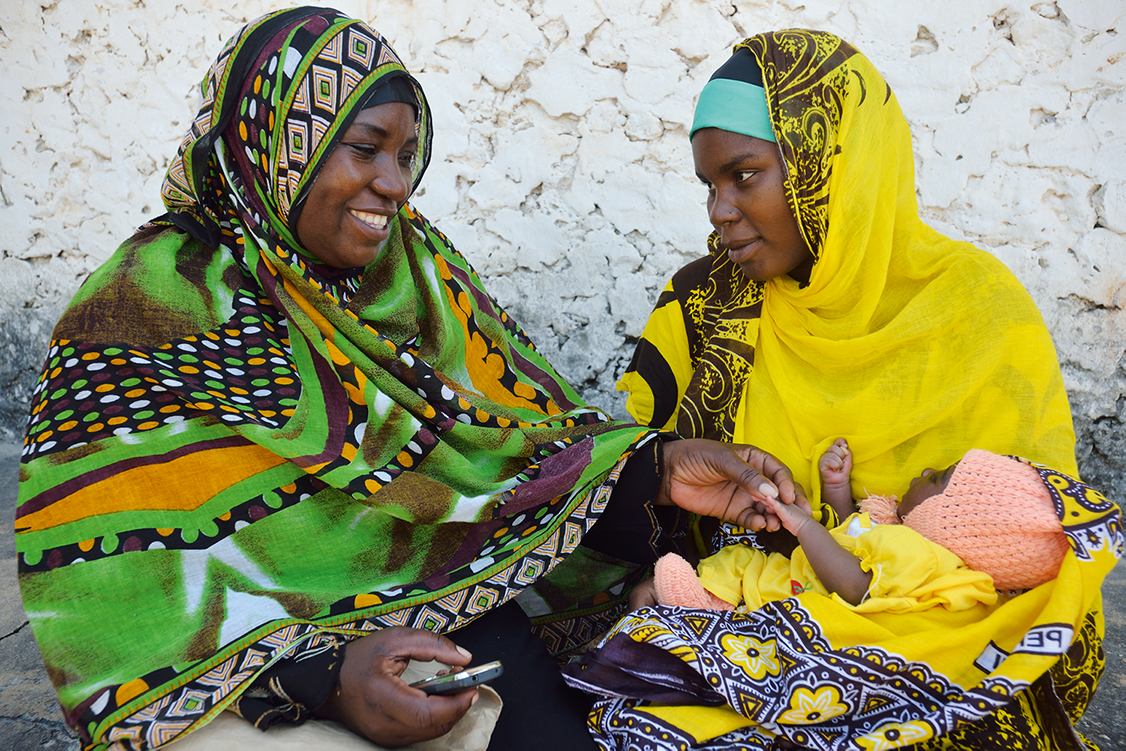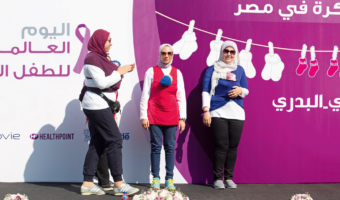Umali smiles as she enters the family compound and sees one-year old Abdul playing ‘pretend’ with a home-made pull toy, a small tyre wheel on a rope. She had brainstormed how to make home-made toys with the boy’s mother on her last home visit and is excited to see her advice being put into practice.
Umali, Abdul, and Abdul’s mother settle down on a small rug. Using a mobile app as a guide, Umali checks in on important health issues, including screening for danger signs and malnutrition, updating Abdul’s immunisation records, and advising on healthy behaviours for good hygiene and nutrition. Next on the visit agenda is a child development check-in. The digital platform continues to guide Umali through monitoring developmental milestones, coaching the family through age-appropriate interactive play, and introducing some communication and early learning activities.
Although the session targets Abdul and his mother, other children and adults begin to gather around as Umali sings songs and demonstrates how to use pots, spoons and even small rocks in toy trucks made from old bottles to promote positive, stimulating interactions between caregivers and children.
Umali is a CHV (community health volunteer) with Jamii ni Afya, a national community health programme in Zanzibar aiming to promote maternal and child health, well-being and optimal child development. Jamii ni Afya CHVs use a smartphone app to deliver integrated health, nutrition, and early childhood development services to mothers and children under 5.
During home visits, CHVs support antenatal care; encourage mothers to give birth in a medical facility; screen and refer for danger signs in pregnancy and early childhood; support breastfeeding; monitor immunisations and nutritional status; and coach on a wide range of health topics including dietary diversity, WASH (water, sanitation and hygiene), and supporting child development. The digital platform prompts screening questions, supports decision making, and guides coaching in health and development.
An evidence-based intervention
Jamii ni Afya officially launched in February 2020, when Zanzibar’s National Community Health Strategy 2020–2025 was released. The strategy now includes CHVs as an essential cadre to expand access to universal health coverage, reaching every household in Zanzibar. Promoting early childhood development is a new priority in Zanzibar’s community health strategy, with potential for significant impact.
In many communities in low- and middle-income countries worldwide, children are falling behind in development at an alarming rate. While detailed developmental data is limited, estimates based on poverty and stunting suggest that over 240 million children worldwide fail to reach their developmental potential (Black et al., 2017). In Zanzibar, national household surveys conducted in 2018 found that one in five children was physically stunted and one in ten had significant delays in development (Ministry of Health, Community Development, Gender, Elderly and Children (MoHCDGEC) et al., 2018; Nelson et al., 2019, unpublished data1).
‘Promoting early childhood development is a new priority in Zanzibar’s community health strategy, with potential for significant impact.’
Common conditions that often have compounding impacts on children’s development include poverty, inadequate nutrition, birth complications, recurrent infections, limited caregiver stimulation and lack of early learning opportunities. The consequences for communities are significant, as deficiencies in child development lead to an estimated eventual 25% reduction in adult economic productivity (Richter et al., 2017).
Jamii ni Afya’s approach to promoting optimal early childhood development is based on the World Health Organization (WHO) and Unicef’s Nurturing Care Framework. The Framework builds from the principle that children develop best in a safe environment that assures good health and nutrition, stimulating and interactive experiences with caregivers, and early learning opportunities (WHO et al., 2018). The early childhood component of the digital platform is adapted from Care for Child Development, an intervention developed to promote child development within health services.
As part of the home visit, CHVs observe caregiver–child interactions, screen for concerns such as maternal stress, harsh discipline, or lack of play materials, and coach caregivers in age-appropriate play and communication activities. The programme is based on scientific evidence that early exposure to positive and responsive interactions with caregivers strengthens neural pathways in the developing brain, leading to stronger language, cognitive, motor and socio-emotional skills as children grow. Prevention of ongoing exposure to adverse experiences such as neglect or violence can avert lifelong and even intergenerational consequences.
Success factors in national launch
In implementing Jamii ni Afya in Zanzibar, the Ministry of Health is partnering with D-tree International, a leading global health organisation with expertise integrating digital health and decision-support systems for frontline health workers. As of April 2020, Jamii ni Afya has been scaled to three districts with nearly 400 CHVs serving more than 40,000 households, including regular visits to 31,000 children under age 5. The government plans to scale the programme to all 11 districts, supporting a population of 1.6 million people, by early 2021.
Jamii ni Afya’s approach to delivering integrated, comprehensive reproductive, maternal, newborn and child health and child development services in a national CHV programme is both innovative and ambitious. The strategy behind the programme’s success illustrates some principles in planning to scale digitally supported community health programmes.
An important factor behind Jamii ni Afya’s ability to launch nationally was the groundwork laid by prior programmes and partnerships. The Safer Deliveries programme, implemented from 2010 to 2019, was a partnership between the Zanzibar Ministry of Health and D-tree International, which successfully introduced digital platforms for maternal and newborn care in the community health system. CHVs worked with pregnant women and newborns to support antenatal and newborn care and promote timely delivery in medical facilities.
Safer Deliveries demonstrated the feasibility and advantages of digital healthcare. It increased the rate of pregnant women delivering in facilities from 50% to 75% among women participating in the programme, increased facility-based postpartum care visits from 20% to 80%, and increased referrals to facilities from 27% to 90% (Battle et al., 2015, and based on D-tree programme data compared to a published study on referral completion, Peterson et al., 2004). CHV performance and motivation improved, with 75% of CHVs meeting performance targets monthly.
‘On the national level, the Jamii ni Afya programme will generate previously unavailable population-level data on child development that can inform both advocacy and policy decisions.’
As the Ministry of Health’s priorities expanded to include child health and development, a decision was made to expand the digitally enabled programme for CHVs, and Jamii ni Afya was conceived. The Jamii ni Afya team held stakeholder workshops to identify local priorities for reproductive, maternal, newborn and child health and child development. A needs assessment, using data from the national nutrition survey and a baseline household survey, demonstrated significant gaps in child development and home environments. Adapting programme content from established national and international guidelines with a clear evidence base also helped facilitate consensus and a rapid launch of the programme.
Intervention design also contributed to Jamii ni Afya’s successful launch. Its digital platform provides a simplified solution for managing the complexity of delivering integrated community health services. CHVs can easily learn to use the platform, and decision-making support and detailed coaching guidance then facilitate a high-quality and wide scope of integrated care delivery. The digital platform significantly reduces the initial CHV training burden, and allows for ongoing updates and refresher training remotely.
The digital platform also seamlessly generates data to inform programme management and quality improvement. Data on visit length, location and content can support CHV supervision, mentorship, workforce management and resource allocation. Data on client characteristics, service delivery, and health outcomes facilitates programme monitoring and evaluation.
Informing programmes globally
As the programme is implemented and evaluated nationwide, Jamii ni Afya is poised to generate learnings to inform early childhood interventions and innovation in low- and middle-income settings more broadly. Having clientlevel data at a national scale about biological, social, and environmental risks and outcomes will enable early childhood services to be tailored to individuals or communities at the highest risk – enabling a level of personalised care that could be groundbreaking in both efficiency and impact.
On the national level, the Jamii ni Afya programme will generate previously unavailable population-level data on child development that can inform both advocacy and policy decisions. Jamii ni Afya is also poised to address critical implementation research questions in the early childhood field globally. While not a controlled trial, implementation at scale will generate programme and outcome data from a wide range of family and care delivery circumstances. Analysing the impact of variables such as dose of intervention, duration of service, and level of paternal involvement may generate knowledge to inform service delivery more broadly. With ongoing implementation, there may be opportunities to address challenges such as appropriate services for families with children who have a developmental delay or disability, or mothers who are struggling with maternal depression.
The impact that Jamii ni Afya is already having in Zanzibar is cause for optimism: families are becoming empowered to help their children reach their full developmental potential. The scope to inform future work in low- and middle-income environments is equally significant. With a digitally enabled, holistic approach and integration at scale within the community health system, Jamii ni Afya is poised to provide population-level data on early childhood risks, outcomes, and programme impact that may serve as an impetus for future advocacy and programming.
References can be found in the PDF version of this article.
1. This report is unpublished but available from the authors on request.


